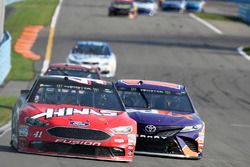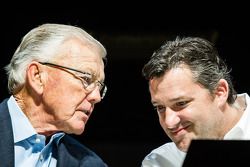Roundtable - The future of Charters in NASCAR
Our team of experts debate some of the biggest questions in NASCAR this week.

Photo by: Rusty Jarrett / NKP / Motorsport Images




























There's been a lot of buzz about the time of the race on Sunday. Do you see NASCAR and its TV partners looking at as a way to shorten races in the future?
Jim: I think it's been on the radar for some time but there are several competing interests in a decision like that. People's attention spans are much shorter and TV in general likes to have events condensed into 3-hour windows. However, shorter races also means a shorter time frame in which to run commercials - and fans always complain about them. If TV continues to want to have events begin later on Sunday afternoons, a shorter race may be the best way to accommodate all the issues revolving around the late start.
Lee: There's been a lot of buzz about the time of the race on Sunday and it appears to be mostly positive. Do you see NASCAR and its TV partners looking at a way to shorten races in the future? Absolutely. Fitting into a three-hour maximum window is the ultimate goal — especially if the races are starting later on Sundays. Ending the event around 6 pm provides the perfect lead in the to primetime on the East Coast and dinner in the Midwest. For West Coasters, those fans can go out and enjoy the day. The shorter races also enable the teams to return home earlier.
Nick: Possibly and I wouldn't mind that. Every race doesn't need to be 400 and 500 miles. But I am not a fan of these late start times. Shorter races that are back to normal start times would be my preference. The roughly two-hour Watkins Glen race from last weekend was refreshing, honestly. F1 runs every single event within a two-hour window, which I think is something NASCAR should shoot for. It would be welcomed change. But of course, the Daytona 500, Brickyard 400, Coca-Cola 600 and Southern 500 should be left in their current state.
Tim: I’ve told friends and colleagues that I feel 90-95% of the races will be shortened in the future to fit pre-race, the race and post-race into a three hour window. My bet is within three-five years we’ll see this for the majority of races. You don’t need a marathon to have a good race. I think historically important races like the Daytona 500, Coca-Cola 600 and maybe the Southern 500 will stay their normal distances, but I feel all bets are off on the remainder of the Cup schedule.
After appearing to be one of the drivers to beat through the first half of the season, it appears Kyle Larson and his No. 42 car have hit a slump. What do you think is the reason for this and do you think he can bounce back?
Jim: We can't forget Larson's "slump" coincides with the absence of Larson's crew chief, Chad Johnston, who had to serve a three-race suspension. He returned for last weekend's race at Watkins Glen. Larson was involved in a wreck at Indy and seemed out to lunch at Pocono but didn't have a problem with speed at the Glen. I suspect he will get back on track very shortly.
Lee: After appearing to be one of the drivers to beat this season through the first half of the season, it appears Kyle Larson and his No. 42 car have hit a slump. What do you think is the reason for this and do you think he can bounce back? I talked to Larson last week leading up to the Glen. He mentioned bad luck at Pocono and Indy as setbacks in the team’s progress — and Joe Gibbs Racing getting hot at the same time. Although Larson didn’t believe crew chief Chad Johnston’s suspension had an effect on the team, how could it not? Talked to Johnston on Sunday. He’s been concentrating on their cars for the Playoffs, so we’ll see.
Nick: I'm not too worried about them. He lost his crew chief for a a couple races there, which may have thrown them off their game. They'll still be a force to be reckoned with come the playoffs, but perhaps not to the level they were early in the season. Joe Gibbs Racing and Furniture Row Racing seem to have surged ahead of the competition in recent weeks and are showing no signs of slowing down.
Tim: I think Larson will work out of this ‘slump’ soon and the return of his crew chief Chad Johnston has a lot to do with that. The combination of a crew chief and driver who understand each other well to me makes a huge difference on race day and this is where Larson will benefit. It also doesn’t hurt that he’ll be racing in Michigan -- a track Larson has excelled at recently.
There was sad news last week with the passing of Harry Scott Jr. At one time he appeared to be the face of opportunity for new car owners to enter the sport, but it didn't work out. Do you think the Charter system in its current format limits new owners from entering the sport or is it just too difficult now for new owners to enter the sport?
Jim: I said when the charters first came into existence, they aren't really worth much unless there are outsiders interested in coming into NASCAR. I didn't see a line of possible owners then and certainly don't now. Providing some equity to team owners is a good thing, but that equity only increases in value of the charters are hard to come by. Right now, they aren't.
Lee: Scott was a fan who fell in love with the sport, first as a sponsor and then as a team owner. The adage: How do you make a small fortune in NASCAR? Start with a large fortune — applies now more than ever with sponsorship shrinking. With charters, new team owners have to decide whether they want to pay the additional seven-figure to play. Is the return on a value-added charter worth the investment? With the number of teams also shrinking, Daytona might be the exception where a team needs a charter to make the field.
Nick: Jim hit the nail on the head. Charters are essentially worthless when there's 36 or 37 cars entered in each race. Charters would be a fine idea if there were more teams trying to squeeze into every field, but there just isn't right now.
Tim: I don’t think the charter system will limit new owners, I think other issues will limit new owners from coming into the sport. The Charters might have been a good idea in the 1990’s, but now with interest seeming to cool in entering the Cup Series they might not be as valuable as some hoped when they launched them a few years ago.
Chase Elliott entered the Cup Series last season with high expectations after winning the NXS championship during his time in NASCAR's top developmental series. Are you surprised he hasn't won yet and what do you think is keeping him out of Victory Lane?
Jim: I am surprised Elliott has not won a race yet in the Cup series. Honestly, that's not unusual for a driver just in his sophomore season, but with how well Elliott and his No. 24 Hendrick Motorsports team performed last season, he appeared ready to roll into Victory Lane any weekend. This season, Elliott has led far fewer laps then last season, but then so has most of Hendrick Motorsports. He and Jimmie Johnson remain the best teams at HMS right now.
Lee: Yes, I’m surprised. Shocked really. Then again, just ask Kasey Kahne about the pressure of racing for Hendrick Motorsports. Elliott clearly has the talent. He’s currently seventh in the standings — the highest Cup driver sans wins. His consistency has led to three second-place finishes. I think Hendrick Motorsports isn’t at the same level as the Toyotas right now. Where Jimmie Johnson’s experience can make up the difference, Elliott is at a deficit.
Nick: He's definitely been close, so he shouldn't beat himself up. It's not like he hasn't performed. Victory Lane can be elusive, even for the best in the sport. It took Kyle Busch 20 races before he was able to win a single race this year despite leading over a thousand laps. He will break through that glass ceiling eventually.
Tim: Based on his success climbing the NASCAR ladder, I felt he would have a handful of wins by now, but then again, this shows you how tough it is to win in the Cup Series. I think Elliott clearly has the talent and the equipment, he just needs a little good luck and experience and the wins will come and come soon for him.
Motorsport.com broke the news last week that the 2018 option for Kurt Busch was not going to be picked up by Stewart-Haas Racing. After the team reported they expected him back next year, do you think this was just some maneuvering of a contract and do you see this becoming the norm with veterans in the sport?
Jim: Even if Stewart-Haas Racing were to re-sign Kurt Busch, it would be for less money than his current contract (and the one they elected not to renew the option on). Right now, SHR has no commitment from Monster Energy to return next season as a sponsor, so it was in Busch's best interest to begin the process of looking at alternatives. The problem is there is a growing list of veteran drivers finding themselves in the same position and the list of possible new rides is a short one.
Lee: Absolutely. And the sport will see more corrections before this trend ends — if ever. Without salary caps, the best teams will be able to buy the most talented drivers.
Nick: It was. But as Jim said, if he were to stay with SHR, he wouldn't be making as much as he is now despite winning the 2017 Daytona 500. On the sponsor side, there are questions as well. Kurt should be looking elsewhere and be prepared unless he wants to be caught out in the cold this off-season. He has time to find a ride right now, but he's not the only big name out there shopping around. Matt Kenseth and Kasey Kahne are hot commodities as well.
Tim: I really think Kurt Busch will be back at Stewart-Haas Racing next year. I believe this is just part of the reset going on now with owners like my colleague Lee Spencer wrote about on Motorsport.com earlier this week. The days of seven-figure guarantees for Cup drivers are over except for an elite few. Most are probably looking at a smaller base salary plus percentages moving forward. I think that is another reason why we’re seeing an influx of some many younger drivers. They’re willing to take less pay for the opportunity.
Be part of Motorsport community
Join the conversationShare Or Save This Story
Subscribe and access Motorsport.com with your ad-blocker.
From Formula 1 to MotoGP we report straight from the paddock because we love our sport, just like you. In order to keep delivering our expert journalism, our website uses advertising. Still, we want to give you the opportunity to enjoy an ad-free and tracker-free website and to continue using your adblocker.



















Top Comments